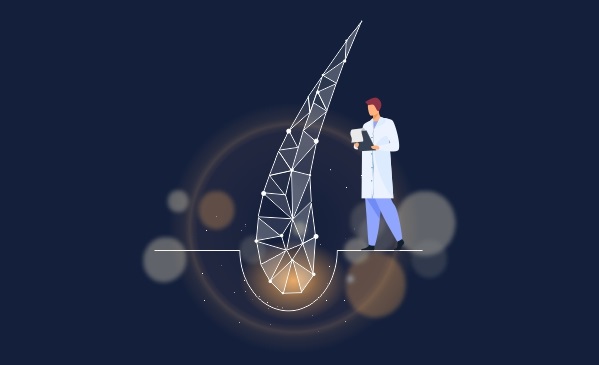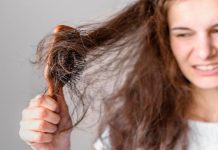Remember those ads by Parachute Advansed Hair Oil?
“Ye baal nahi hai, ye main hu” the line says it all!
Our hair speaks volumes about our health and well-being. So, if you are suddenly noticing lots of hair on your hair brush or bathroom floor, it could be a sign of underlying health conditions. There are several ways to fix hair fall, but before finding the right fix, it is essential to understand the cause of it.
Book Hair fall Test Now
Hair Fall test designed for male and Female
Genetics at play
One key factor for hair fall is genetics. Genetics determine how your hair will grow (or worsen) with age. Hereditary hair fall is called androgenic alopecia (male pattern baldness or female pattern baldness). We all have 23 chromosome pairs containing genes packed with genetic information. These genes decide all your traits, right from your eye colour to blood type. A pair of sex chromosomes determines your biological sex (women contain XX, whereas men contain XY chromosomes).
The X chromosome contains an AR gene that helps synthesize androgen receptor protein. Changes in this gene increase the activity of androgen receptors in hair follicles, causing shortened hair growth cycle, delayed growth of new hair and shorter weaker hair. Men inherit the X chromosome from their mother, hence the common myth that male pattern baldness comes from maternal family. Now before you get all upset over your mother for your hair fall, know that the latest research suggests that >80% of people with alopecia have a father suffering from the same. Also, hereditary hair fall involves >63 genes, and only six of them are found on the X chromosome.
Lifestyle matters too
Before blaming your parents for anything, consider that problem might also be you. Your lifestyle choices are the second biggest contributing factor to hair fall. Let’s take a look at your enemies that are masquerading as allies in this battle against hair fall.
You are what you eat, and so are your hair
Anything in excess is bad for your health, mainly excess sugar. If you are eating foods high in glycemic index (GI), it is not going to affect only your body but your hair too. Common examples include white bread, white rice, potatoes, refined flour and sweets. High-GI foods disturb the hormonal balance. This further spikes up your insulin and androgens, which bind to hair follicles and cause hair fall. Moreover, if your body is running low on proteins, it will find ways to conserve them, and this includes halting hair growth. After 2–3 months, your hair will start falling out. So, include more proteins and iron in your diet. Also, be sure to eat enough beans, pulses, meat, eggs, fish, nuts, seeds and mineral-rich foods.
Worth the weight?
If you spend almost 9 hours/day sitting and are overall physically inactive, the resulting obesity is going to play havoc with your hormones. When you are overweight, your body goes under extreme stress to produce thyroxine and insulin, causing hormonal imbalance. The link between insulin resistance and hyper/hypothyroidism creates a chain of reactions throughout the body, which affects your hair too. Obesity also hampers your heart functions. With problems like abnormal blood pressure and high cholesterol, you might have to live on medications for life, and prolonged use of some drugs has a tendency to impact hair structure and growth.
It’s not just about weight gain. If you have undergone weight-loss surgery, your hair is at risk of falling too. Post surgery, your zinc levels will likely be low, making your hair dry and prone to breakage. Check with your doctor whether you need zinc and copper supplements.
Skin conditions
Not only our emotions, but our scalp is sensitive too. Various scalp conditions can lead to hair fall. Seborrheic dermatitis is a common culprit. It often occurs near the oil-secreting sebaceous glands on your scalp and skin and causes scaly patches, inflamed skin, itching and dandruff.
Steroids: Gaining muscles or losing hair?
If you are fitness fanatic, you might have taken steroids to bulk up. Steroids increase muscle mass, strength and athletic performance, but they can also strip off your scalp. Steroids can do both: 1) accelerate male pattern baldness and 2) induce hair fall in those who are not genetically predisposed to it. In men, testosterone is the most common steroid hormone. Taking steroids increases the production of testosterone and its byproduct dihydrotestosterone. Both strongly bind to hair follicles, causing them to shrink and shortening the hair growth cycle. This makes your hair thinner, more brittle and fall out fast. So, higher the levels of steroids, higher the damage to hair.
Smoking kills
And it doesn’t get said enough. Be it your heart, lungs, kidneys, brain, teeth, gums or hair, cigarettes induce a slow death that no part of your body can escape. Cigarette components are vasoconstrictors. Meaning? They narrow down your blood vessels and block/reduce blood flow throughout the body. Your hair follicles always require a fresh supply of blood to stay healthy. Reduced blood flow slows down hair growth and damages hair structure. There is simply no good reason to spark up that next cigarette. Just quit!
Relax, don’t stress it
Stress: No one wants it, but sometimes some situations present it in front of us. Cortisol is a primary stress hormone released by your body. The resulting hormonal imbalance causes either of the following:
- Telogen effluvium: Stress pushes your hair follicles into resting phase, so that they don’t produce new hair strands and are prone to falling out.
- Trichotillomania: Some people under stress have an irresistible urge to pull out hair. This is often a psychological way of handling stress, which leads to hair fall.
- Alopecia areata: The body’s immune system can start attacking hair follicles, causing hair fall.
In today’s world, it is an absolute must to prioritise your mental health. You can deal with stress in many ways. Learn some relaxation techniques (meditation, yoga, breathing exercises, etc.), get regular exercise, follow a healthy diet or seek positive-minded company. Remember, be it hair fall or mental health, if there is a problem, there is always a solution.
Medical conditions & medications
A wide spectrum of health conditions can cause hair fall, like pregnancy, childbirth, menopause, polycystic ovary syndrome, nutrient deficiencies, thyroid problems, eating disorders, cancer, etc. Certain medications can also exert effects that lead to hair fall. Some common examples include:
- Blood thinners
- Acne medicines
- Antidepressants
- Beta-blockers
- Cholesterol-lowering drugs
- Medications high in vitamin A
- Anabolic steroids
- Birth control pills
If you are already on medications and experiencing hair fall, consult your doctors for proper guidance.
Treat your hair with care
If none of the above are applicable or make sense as to why you are having hair fall, then maybe it’s time to step back and reconsider your hair care routine. Several mistakes in our routine can damage hair and scalp:
- Using too much shampoo
- Using chemical products (sulfate-based shampoos, bleach, hair sprays, dyes, etc.)
- Brushing hair vigorously
- Combing wet hair
- Drying wet hair with a towel
- Using excess heat on hair (blow dryers, curling/flat iron, etc.)
- Tying your hair tight
- The list might be too long to continue…
Testing at Thyrocare
Our body is always giving signs and symptoms of potential health problems. So, instead of visiting your doctor tomorrow (which never arises), get regular health check ups for prevention and early diagnosis. Thyrocare has launched Hair Fall Screening Advanced Profiles for men and women. The profiles evaluate over 40 health parameters and help you get to the root cause of your hair fall. Don’t delay and get tested today!










